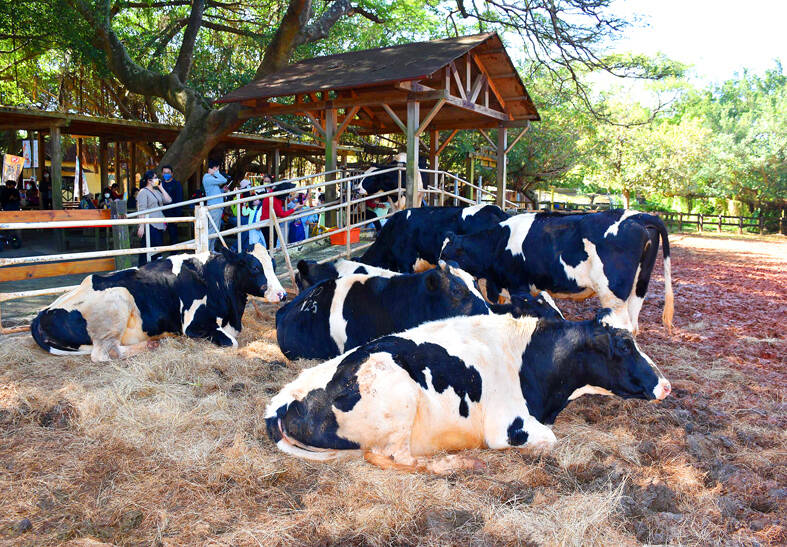The Council of Agriculture said it is developing isotope distinguishment technology, which, combined with “big data,” would differentiate the production location of dairy products.
The plan was made due to concerns about the impending removal of tariffs for Taiwanese imports of New Zealand beef, lamb and dairy products — as a result of the Agreement Between New Zealand and the Separate Customs Territory of Taiwan, Penghu, Kinmen and Matsu on Economic Cooperation (ANZTEC) — would significantly affect domestic dairy and meat markets, the council said.
ANZTEC, signed in 2013, removed tariffs on a set amount of liquid dairy products — 5,500 tonnes as of 2013 — and adds a charge of NT$14 for every kilogram exceeding that amount.

Photo: Lee Jung-ping, Taipei Times
It was agreed that the allocated amount of tariff-free products would increase by 1,500 tonnes every three years until 2025, when quotas would be removed.
As of last month, Taiwan has imported 103,562 tonnes of dairy products, a 9.2 percent increase compared with the same period last year, the council said.
It also said it plans to encourage domestic dairy quality, match domestic dairy production to market needs and step up measures to distinguish local and imported dairy products.
Over the past decade, domestic dairy production has increased from 320,000 tonnes to 430,000 tonnes, the council said.
Due to high domestic demand, dairy farmers have been known to produce amounts exceeding the quota, and contracted processing companies have been more than willing to purchase the excess, it said.
However, as the domestic dairy market is becoming saturated and the nation’s economic environment is causing public spending to turn conservative, processing companies are demanding that dairy producers observe the output quotas.
There are standard certifications for milk, but they could be improved to differentiate local and imported dairy products, the council said, adding that it is developing a system to do so.
The council said that the system, which has been trialed for two years, has a 90 percent accuracy rate in differentiating the origin country of dairy products, and it can also determine whether milk is fresh or made from powder.
The system is almost complete, and can be used to inspect pork and chicken meat to identify the country of origin, it said, adding that Taiwan would provide product origin information on packaging.

Taiwan has received more than US$70 million in royalties as of the end of last year from developing the F-16V jet as countries worldwide purchase or upgrade to this popular model, government and military officials said on Saturday. Taiwan funded the development of the F-16V jet and ended up the sole investor as other countries withdrew from the program. Now the F-16V is increasingly popular and countries must pay Taiwan a percentage in royalties when they purchase new F-16V aircraft or upgrade older F-16 models. The next five years are expected to be the peak for these royalties, with Taiwan potentially earning

STAY IN YOUR LANE: As the US and Israel attack Iran, the ministry has warned China not to overstep by including Taiwanese citizens in its evacuation orders The Ministry of Foreign Affairs (MOFA) yesterday rebuked a statement by China’s embassy in Israel that it would evacuate Taiwanese holders of Chinese travel documents from Israel amid the latter’s escalating conflict with Iran. Tensions have risen across the Middle East in the wake of US and Israeli airstrikes on Iran beginning Saturday. China subsequently issued an evacuation notice for its citizens. In a news release, the Chinese embassy in Israel said holders of “Taiwan compatriot permits (台胞證)” issued to Taiwanese nationals by Chinese authorities for travel to China — could register for evacuation to Egypt. In Taipei, the ministry yesterday said Taiwan

‘LIKE-MINDED PARTNER’: Tako van Popta said it would be inappropriate to delay signing the deal with Taiwan because of China, adding he would promote the issue Canadian senators have stressed Taiwan’s importance for international trade and expressed enthusiasm for ensuring the Taiwan-Canada trade cooperation framework agreement is implemented this year. Representative to Canada Harry Tseng (曾厚仁) in an interview with the Central News Agency (CNA) said he was increasingly uneasy about Ottawa’s delays in signing the agreement, especially as Ottawa has warmed toward Beijing. There are “no negotiations left. Not only [is it] initialed, we have three versions of the text ready: English, French and Mandarin,” Tseng said. “That tells you how close we are to the final signature.” Tseng said that he hoped Canadian Prime Minister Mark Carney

Taiwan is awaiting official notification from the US regarding the status of the Agreement on Reciprocal Trade (ART) after the US Supreme Court ruled US President Donald Trump's global tariffs unconstitutional. Speaking to reporters before a legislative hearing today, Premier Cho Jung-tai (卓榮泰) said that Taiwan's negotiation team remains focused on ensuring that the bilateral trade deal remains intact despite the legal challenge to Trump's tariff policy. "The US has pledged to notify its trade partners once the subsequent administrative and legal processes are finalized, and that certainly includes Taiwan," Cho said when asked about opposition parties’ doubts that the ART was